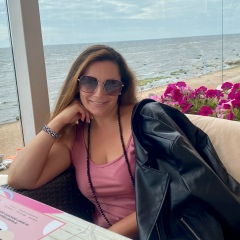Увлекательный хорошо написанный рассказ о поездке из Германии на родину. Не знаю, какое там соотношение художественного вымысла и реальности, но охотно верю, что всё примерно так и было. Удивительно, что в поезде с ним ничего подобного не произошло, в плацкарте такого рода разговоры - обычное дело.
В комментариях пишут: "Живу в Питере/Москве. Такого не замечаю. Всё выдумка." А мне почему-то вспомнилась следующая недавняя история. Мы были у друзей в Москве и гуляли с ними по Булгаковским местам. Недалеко от Патриарших прудов и места, где Аннушка разлила масло, мы зашли в погреться кафе. За соседним столом сидели две дамы с детьми и муж одной из них. Разговор этих дам сначала привлёк моё внимание тем, что дамы были явно "воцерковленные" - одна из них громко рассказывала другой какие иностранные имена имеют православные аналоги (а значит ими можно называть детей), а какие нет (и следовательно, так называть детей нельзя).
Как потом оказалось, присутствующий муж одной из этих женщин - иностранец (наверное, австриец), который довольно хорошо говорит по-русски, хоть и с явным акцентом.
В какой-то момент разговор у них зашёл о том, где же муж второй дамы. И оказалось, что он в командировке на стройках в Сочи и в Крыму. Соответственно, тема разговора моментально переключилась на Крым. Мужчина спросил, как эта дама относится к ситуации с Крымом. Дама выпалила: "А что, с Крымом всё отлично! Там был референдум. Он наш! Всё законно!" Мужчина очень тактично привел какие-то аргументы, что не всё так радужно. Он приводил в пример историю с Северным Тиролем, говорил о международных законах и т.д. Не найдя достойных контраргументов женщина моментально сменила позицию: "Может быть это и незаконно, но мы обязанны были забрать Крым, потому, что иначе бы его забрали американцы." В наступившей неловкой тишине можно было услышать, как челюсть неподготовленного к такому повороту иностранца звонко ударила о стол. Нужно было видеть его растерянность и непонимание.
После некоторой паузы он осторожно спросил: "Какие в Крыму американцы?". На что женщина ответила: "Как же, они уже всю Украину захватили! Только Крым и Донбасс мы им не отдали". Иностранец попытался что-то возразить, но понял что это бесполезно и вежливо сменил тему. Женщина мечтательно заметила: "Эх, жалко моего мужа нет.... Вот он бы тебе рассказал, он в этом разбирается!".
Не знаю, почему эта довольно обычная история меня так поразила. Может быть потому, что я хорошо понимаю ту беспомощность, которую ощутил иностранец, когда разговор свернул не туда.
В комментариях пишут: "Живу в Питере/Москве. Такого не замечаю. Всё выдумка." А мне почему-то вспомнилась следующая недавняя история. Мы были у друзей в Москве и гуляли с ними по Булгаковским местам. Недалеко от Патриарших прудов и места, где Аннушка разлила масло, мы зашли в погреться кафе. За соседним столом сидели две дамы с детьми и муж одной из них. Разговор этих дам сначала привлёк моё внимание тем, что дамы были явно "воцерковленные" - одна из них громко рассказывала другой какие иностранные имена имеют православные аналоги (а значит ими можно называть детей), а какие нет (и следовательно, так называть детей нельзя).
Как потом оказалось, присутствующий муж одной из этих женщин - иностранец (наверное, австриец), который довольно хорошо говорит по-русски, хоть и с явным акцентом.
В какой-то момент разговор у них зашёл о том, где же муж второй дамы. И оказалось, что он в командировке на стройках в Сочи и в Крыму. Соответственно, тема разговора моментально переключилась на Крым. Мужчина спросил, как эта дама относится к ситуации с Крымом. Дама выпалила: "А что, с Крымом всё отлично! Там был референдум. Он наш! Всё законно!" Мужчина очень тактично привел какие-то аргументы, что не всё так радужно. Он приводил в пример историю с Северным Тиролем, говорил о международных законах и т.д. Не найдя достойных контраргументов женщина моментально сменила позицию: "Может быть это и незаконно, но мы обязанны были забрать Крым, потому, что иначе бы его забрали американцы." В наступившей неловкой тишине можно было услышать, как челюсть неподготовленного к такому повороту иностранца звонко ударила о стол. Нужно было видеть его растерянность и непонимание.
После некоторой паузы он осторожно спросил: "Какие в Крыму американцы?". На что женщина ответила: "Как же, они уже всю Украину захватили! Только Крым и Донбасс мы им не отдали". Иностранец попытался что-то возразить, но понял что это бесполезно и вежливо сменил тему. Женщина мечтательно заметила: "Эх, жалко моего мужа нет.... Вот он бы тебе рассказал, он в этом разбирается!".
Не знаю, почему эта довольно обычная история меня так поразила. Может быть потому, что я хорошо понимаю ту беспомощность, которую ощутил иностранец, когда разговор свернул не туда.
A fascinating well-written story about a trip from Germany to their homeland. I do not know what the ratio of artistic fiction and reality is, but I readily believe that this was about it. It is surprising that nothing of the kind happened to him on the train, in a reserved seat such talk is a common thing.
In the comments write: "I live in St. Petersburg / Moscow. I don’t notice this. Everything is fiction." And for some reason I remembered the following recent history. We were with friends in Moscow and walked around Bulgakov places with them. Not far from the Patriarch's Ponds and the place where Annushka poured oil, we stopped at a cafe. At the next table were two ladies with children and the husband of one of them. At first, the conversation of these ladies attracted my attention by the fact that the ladies were obviously “churched” - one of them loudly told the other which foreign names have Orthodox equivalents (which means they can be called children) and which are not (and therefore children should not be called that) .
As it turned out later, the present husband of one of these women is a foreigner (probably an Austrian), who speaks Russian fairly well, albeit with a clear accent.
At some point, they started talking about where the husband of the second lady was. And it turned out that he was on a business trip at construction sites in Sochi and in the Crimea. Accordingly, the topic of conversation immediately switched to the Crimea. A man asked how this lady relates to the situation with the Crimea. The lady blurted out: "And that, everything is fine with the Crimea! There was a referendum there. It is ours! Everything is legal!" The man very tactfully led some arguments that not everything is so rosy. He cited the story of North Tyrol, spoke about international laws, etc. Not finding decent counterarguments, the woman instantly changed her position: "It may be illegal, but we were obliged to take the Crimea, because otherwise the Americans would have taken it." In the awkward silence that followed, one could hear the jaw of an unprepared for such a turn of a foreigner loudly hit the table. It was necessary to see his confusion and misunderstanding.
After a pause, he cautiously asked: "What are Americans in Crimea?" To which the woman replied: "Well, they have already captured the whole of Ukraine! Only the Crimea and the Donbass we did not give them." The foreigner tried to argue something, but realized that it was useless and politely changed the subject. The woman dreamily remarked: "Oh, sorry my husband is gone .... So he would tell you, he understands this!".
I do not know why this rather ordinary story struck me so. Maybe because I understand well the helplessness that a foreigner felt when the conversation turned the wrong way.
In the comments write: "I live in St. Petersburg / Moscow. I don’t notice this. Everything is fiction." And for some reason I remembered the following recent history. We were with friends in Moscow and walked around Bulgakov places with them. Not far from the Patriarch's Ponds and the place where Annushka poured oil, we stopped at a cafe. At the next table were two ladies with children and the husband of one of them. At first, the conversation of these ladies attracted my attention by the fact that the ladies were obviously “churched” - one of them loudly told the other which foreign names have Orthodox equivalents (which means they can be called children) and which are not (and therefore children should not be called that) .
As it turned out later, the present husband of one of these women is a foreigner (probably an Austrian), who speaks Russian fairly well, albeit with a clear accent.
At some point, they started talking about where the husband of the second lady was. And it turned out that he was on a business trip at construction sites in Sochi and in the Crimea. Accordingly, the topic of conversation immediately switched to the Crimea. A man asked how this lady relates to the situation with the Crimea. The lady blurted out: "And that, everything is fine with the Crimea! There was a referendum there. It is ours! Everything is legal!" The man very tactfully led some arguments that not everything is so rosy. He cited the story of North Tyrol, spoke about international laws, etc. Not finding decent counterarguments, the woman instantly changed her position: "It may be illegal, but we were obliged to take the Crimea, because otherwise the Americans would have taken it." In the awkward silence that followed, one could hear the jaw of an unprepared for such a turn of a foreigner loudly hit the table. It was necessary to see his confusion and misunderstanding.
After a pause, he cautiously asked: "What are Americans in Crimea?" To which the woman replied: "Well, they have already captured the whole of Ukraine! Only the Crimea and the Donbass we did not give them." The foreigner tried to argue something, but realized that it was useless and politely changed the subject. The woman dreamily remarked: "Oh, sorry my husband is gone .... So he would tell you, he understands this!".
I do not know why this rather ordinary story struck me so. Maybe because I understand well the helplessness that a foreigner felt when the conversation turned the wrong way.
У записи 4 лайков,
1 репостов.
1 репостов.
Эту запись оставил(а) на своей стене Александр Смаль
























